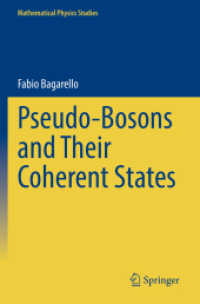- ホーム
- > 洋書
- > 英文書
- > Politics / International Relations
Full Description
The United Nations, Indo-Pacific and Korean Peninsula focuses on the United Nations (UN) and its frameworks to examine the power politics on the two of the world's more politically sensitive and geo-strategically crucial regions of the Korean Peninsula and the Indo-Pacific.
This book provides answers to broader questions that are relevant to the global emerging peace architecture. The book is divided into three parts: global, Indo-Pacific and the Korean Peninsula. The first part analyses the competing world views of the U.S, China, Japan, and Korea and the evolvement of UN debates on global and regional security, with special emphasis on the Indo-Pacific and the Korean Peninsula. The second part concerns major bilateral or multilateral security issues facing Indo-Pacific countries and their UN debates in this regard. In particular, with new developments in the Indo-Pacific, such as the Quad process involving the Australia-India-Japan-United States and an anticipation expansion of the Group of Seven (G-7), chapters analyse how these mechanisms expand their focus within the scope of Indo-Pacific power politics. Part three focuses on the UN centered debates on two Koreas and their strategic fallouts at regional and global levels.
Examining the security order evolving around the politics of the Indo-Pacific regions and Korean Peninsula and analysing the relevance of the UN and its mechanisms, this book will be of interest to researchers studying International Relations, Security Studies, Asian Studies, in particular Korean Studies and the Indo-Pacific.
Chapter 4 of this book is freely available as a downloadable Open Access PDF at http://www.taylorfrancis.com under a Creative Commons Attribution-Non Commercial-No Derivatives (CC-BY-NC-ND) 4.0 license.
Contents
Introduction: Can the Declining Relevance of the UN be Reinvigorated? Factoring the Indo-Pacific and Korean Peninsula Part-I: The UN and Competing Worldviews 1. US-China Strategic Competition in UN Multilateral Frameworks: Building Order or Inviting Conflict?; 2. The United Nations in Korea: US Views of Once and Future Roles; 3. Legitimacy, Power and Order-Building in the Indo-Pacific: China, the UN, and Managing the North Korean Nuclear Challenge; 4. Role of the United Nations in Japanese Foreign Policy and Security Architecture; 5. The United Nations, Korean Foreign Policy and the Korean Peninsula Part-II: The UN and the Indo-Pacific Security Architecture 6. China, UNCLOS and the Future of International Maritime Law in the South China Sea; 7. Opportunities for Consensus, Collaboration and Recalibration: UN and the Quad; 8. Does Humanitarian Aid Save Civilian Lives in War? The Case of UN Aid in Myanmar's Civil War; 9. The United Nations and the Curious Case of Sino-Indian Boundary Dispute Part-III: The UN, its Frameworks and Korean Peninsula 10. Northeast Asian Peace Architecture and the UN; 11. Change in the Security Environment and Transformation of the United Nations Command; 12. The Past, Present and Future of SDGs Discussion on the Korean Peninsula: SDGs as a Framework for New Cooperation; 13. A Case Study on the Success and Failure of Weapons of Mass Destruction Nonproliferation Regimes: Focus on Chemical Weapons and Biological Weapons Conventions; 14. Improving State Reputation through the UN: The Case of North Korea








